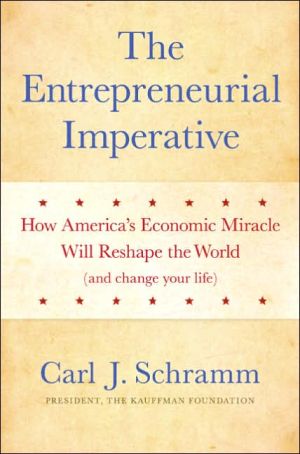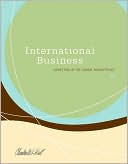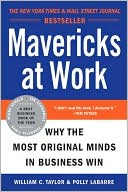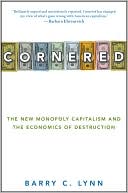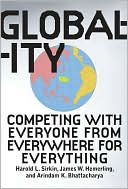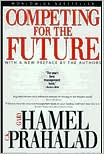Entrepreneurial Imperative: How America's Economic Miracle Will Reshape the World (and Change Your Life)
In 2004, Carl Schramm, president of the Kauffman Foundation, the world's leading foundation for entrepreneurship, published a groundbreaking essay with a radical premise: that Americans literally have no conception of the secret that truly underlies our economic success, and that for the United States to survive and continue to lead the world's economy, it is imperative we learn to understand and employ that secret.\ The secret that has led the American economy to become the world's...
Search in google:
In 2004, Carl Schramm, president of the Kauffman Foundation, the world's leading foundation for entrepreneurship, published a groundbreaking essay with a radical premise: that Americans literally have no conception of the secret that truly underlies our economic success, and that for the United States to survive and continue to lead the world's economy, it is imperative we learn to understand and employ that secret. The secret that has led the American economy to become the world's strongest? Our unparalleled skill as entrepreneurs. As Schramm compellingly shows in this sweeping manifesto, entrepreneurship alone—not anything else—can give America the necessary leverage to remain an economic superpower. Not technology, since everyone now has the same technology, or access to it. Not education—we are years behind other nations in this area. Not basic manufacturing, long since moved overseas from the United States. And not capital markets, now truly global entities. Drawing on detailed research conducted by the Kauffman Foundation and on his decades of experience as an entrepreneur himself and as a leader and mentor to other entrepreneurs, Schramm persuasively demonstrates in detail what this entrepreneurial imperative means for the way we run universities and foundations, lead companies, make personal job decisions, and even conduct our foreign affairs. The Entrepreneurial Imperative will change not only the way our government, corporations, and nonprofits operate, but also our day-to-day lives as working Americans. Publishers Weekly Entrepreneurship is the hammer that Schramm wields, and everything looks like a nail. He calls the freedom to start one's own business key to the nation's survival, "the only uniquely American resource at our disposal" and "the only answer if we hope to continue to thrive." Schramm makes a solid case for emphasizing entrepreneurial thinking and policy; he notes that globalization has stripped away any U.S. advantage in technology, education and manufacturing, and argues that big companies must remodel themselves after technologically savvy startups. But as with any monomaniac, his rigidity is hard to take seriously. ("Aren't there other solutions?" he asks on the book's first page, answering: "No.") His "sweeping manifesto" rails against bureaucracy, the Small Business Administration and "big business, big government, and big labor." Some readers will raise eyebrows at his take on entrepreneurship's role in democracy's rise, at his rant about antibusiness attitudes in the academy or at his contention that "entrepreneurship must be the basis of our foreign policy." Schramm may be right in insisting that only entrepreneurial capitalism "will allow us to continue to enjoy our standard of living," but his perspective is too narrow to draw in many people who don't already share it. (Oct.) Copyright 2006 Reed Business Information.
\ \ The Entrepreneurial Imperative\ \ \ \ How America's Economic Miracle Will Reshape the World (and Change Your Life)\ \ \ \ By Carl Schramm\ \ \ HarperCollins Publishers, Inc.\ \ \ \ Copyright © 2006\ \ Carl Schramm\ All right reserved.\ \ ISBN: 006084163X\ \ \ Chapter One\ The Entrepreneurial Imperative\ \ America's future in the global economy\ For the united states to survive and continue its economic and political leadership in the world, we must see entrepreneurship as our central comparative advantage. Nothing else can give us the necessary leverage to remain an economic superpower. Nothing else will allow us to continue to enjoy our standard of living. We either support and nurture increasingly entrepreneurial activities in all aspects of our society and around the globe, or run the very real risk that we will become progressively irrelevant on the world stage and suffer economically at home.\ In short, entrepreneurship in our businesses and universities; in our approach to both government and foreign policy; and in our personal lives is the only answer if we hope to continue to thrive.\ Aren't there other solutions?\ No.\ Technology isn't the answer, since everyone now either has the same technology or can easily obtain it. By definition, when everyone has access to the same asset, the asset itself can't supply an edge. Only innovative, entrepreneurial ways of employing that technology can provide a comparative advantage.\ Education will not keep us out in front.Many parts of the world surpass the United States in teaching skills needed for the future. While we must pay more attention to education, especially in math and the sciences, simply drawing even with countries now leading, such as Japan and South Korea, will not be enough--we won't be ahead. We must learn new entrepreneurial ways to employ what we learn.\ It is imperative that we do so: For example, we have largely given up when it comes to basic manufacturing because we simply can't compete globally on price. Instead of running these factories, we need to exploit the advanced skills, niche opportunities, and geographic advantages that will allow American manufacturers to succeed. In a word, when it comes to manufacturing, we must become entrepreneurial.\ Could our financial skills keep us ahead? It is true we possess a substantial edge in finance. We have huge sums of money to invest, and our capital markets are, indeed, the envy of the world, attracting money to our shores thanks to their efficiency and safety. But the fact is that all capital markets are now global and other parts of the world are beginning to enjoy or adopt our safeguards, so whatever sustainable advantage we have is bound to be fleeting. The only way to gain an edge is to back entrepreneurs and share in their success.\ The only uniquely American resource at our disposal is entrepreneurial capitalism, and it is imperative that we nurture it. We must make sure that developing entrepreneurial systems reward risk takers who set out to be creative and innovative, who produce a product or service that allows us to do something better, faster, cheaper. It is the resulting efficiency of their efforts that permits wealth to be redeployed in ways that produce more wealth.\ The message of this book is simple: entrepreneurship is America's comparative advantage, and we need to exploit it fully both at home and abroad. We have an entrepreneurial imperative. The pages ahead explain what this means and what we must do to achieve its promise. They also discuss the effect that the entrepreneurial imperative will have on our nation and on our individual lives.\ Specifically, this book examines the four key components of our nation's economy--large corporations, government, universities, and start-up firms--and how different approaches to them will allow us to become even more entrepreneurial and what that means for us as individuals. These four institutions provide the greatest possibility for fostering entrepreneurial growth both here and abroad. Encouraging, managing, and supporting an entrepreneurial economy is central to our place in the world going forward. America enjoys both democracy and freedom, and this book shows that entrepreneurship is the force most likely to provide true freedom for individuals across the globe and here at home by giving everyone the opportunity to fulfill their potential.\ Entrepreneurship is not only an integral part of our genius but also the only uniquely American resource at our disposal and we must exploit it fully.\ \ \ Digging Deeper\ \ \ This book discusses what it means to see entrepreneurship as our central comparative advantage and its impact on the way we:\ \ \ \ \ Start companies\ \ \ Lead large, existing companies\ \ \ Run universities\ \ \ Make our personal job decisions (where and how we choose to work)\ \ \ Conduct foreign affairs\ \ \ \ \ The starting point is to define what I mean by both entrepreneurship and being entrepreneurial, then talk about how the concepts can be applied in each of the preceding areas to provide us with the greatest comparative advantage and personal freedom and enjoyment.\ \ \ \ Entrepreneurship is the process in which one or more people undertake economic risk to create a new organization that will exploit a new technology or innovative process that generates value to others.\ The entrepreneur is one who undertakes personal economic risk to create a new organization that will exploit a new technology or innovative process that generates value to others.\ \ \ \ \ As you can see from these definitions, entrepreneurship is an infinitely renewable resource. Every time an entrepreneur starts a business, convinced that she has spotted a niche in the marketplace or that it is the best way to control her economic fate, it is another step forward for democratic capitalism, a system of widespread participation and opportunity that protects political and economic liberties.\ As renowned economist William Baumol has observed, the entrepreneur is "an indispensable component" of growth and prosperity--"the bold and imaginative deviator from established business patterns and practices, who constantly seeks the opportunity to introduce new products and new procedures, to invade new markets, and to create new organizational forms."\ We must make such trailblazing occur more often so that America can maintain and strengthen its position in the world marketplace. Generating additional ways to help us become more entrepreneurial as a people and as a nation, however, . . .\ \ Continues...\ \ \ \ \ \ \ Excerpted from The Entrepreneurial Imperative\ by Carl Schramm\ Copyright © 2006 by Carl Schramm.\ Excerpted by permission.\ All rights reserved. No part of this excerpt may be reproduced or reprinted without permission in writing from the publisher.\ Excerpts are provided by Dial-A-Book Inc. solely for the personal use of visitors to this web site.\ \ \
1The entrepreneurial imperative12The entrepreneurial American153Our Lazarus moment : an entrepreneurial America reborn234The entrepreneur575Entrepreneurs are from Venus, managers are from Mars886Universities and the entrepreneurial imperative1217Exporting entrepreneurship1548In conclusion170
\ Steve Forbes"[E]ssential reading to understand and prepare for our personal lives and the future."\ \ \ \ \ Scott Cook"Schramm unlocks the key to growth. . . and roots it in the American spirit inside us all."\ \ \ Paul Orfalea"[E]ssential reading to understand and prepare for our personal lives and the future."\ \ \ \ \ Stephen Wolter"Reading The Entrepreneurial Imperative it’s hard not to like Carl J. Schramm. [A]n optimistic cheerleader for American capitalism."\ \ \ \ \ Paul Kedrosky"[The] one book that lays out…why entrepreneurship matters. The Economist didn’t call Schramm the "evangelist of entrepreneurship" for nothing.\ \ \ \ \ The Economist"As Carl Schramm argues … in The Entrepreneurial Imperative, no country has mastered innovation and entrepreneurship as effectively as America."\ \ \ \ \ Publishers WeeklyEntrepreneurship is the hammer that Schramm wields, and everything looks like a nail. He calls the freedom to start one's own business key to the nation's survival, "the only uniquely American resource at our disposal" and "the only answer if we hope to continue to thrive." Schramm makes a solid case for emphasizing entrepreneurial thinking and policy; he notes that globalization has stripped away any U.S. advantage in technology, education and manufacturing, and argues that big companies must remodel themselves after technologically savvy startups. But as with any monomaniac, his rigidity is hard to take seriously. ("Aren't there other solutions?" he asks on the book's first page, answering: "No.") His "sweeping manifesto" rails against bureaucracy, the Small Business Administration and "big business, big government, and big labor." Some readers will raise eyebrows at his take on entrepreneurship's role in democracy's rise, at his rant about antibusiness attitudes in the academy or at his contention that "entrepreneurship must be the basis of our foreign policy." Schramm may be right in insisting that only entrepreneurial capitalism "will allow us to continue to enjoy our standard of living," but his perspective is too narrow to draw in many people who don't already share it. (Oct.) Copyright 2006 Reed Business Information.\ \
